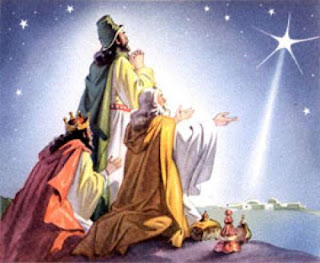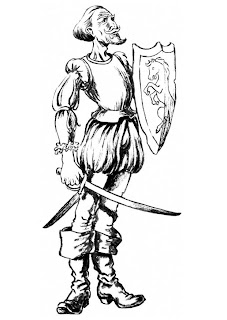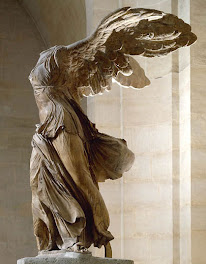"La Navidad se aproximaba. El invierno irrumpía con dureza. Nevaba hasta en el llano, cosa poco frecuente en Andalucia.
Un anochecer, apareció en Candera una niña de unos nueve o diez años, medio desnuda. Vestía una falda hecha jirones, entre cuyos desgarros aparecía la carne amoratada por el frío. Calzaba alpargatas muy viejas y mojadas, y, de cintura para arriba, solamente llevaba una especie de sostén.
Todos quedaron horrorizados al ver a aquella criatura con semejante indumentaria en un día tan crudo. La hicieron entrar en la posada de Mari Juana, y la niña fue derecha a sentarse en el suelo de la candela. Cuando entró en calor junto a la lumbre, le dieron pan y tocino, que comió con voracidad. Durmió en una de las camas de la posada.
Durante los tres días que la niña estuvo en Candera, fue el centro de atención del pueblo. Todos la llamaban, la interrogaban, le daban dulces, vestidos... Socorro "La Descarriá" le regaló un collar de cuentas azules. La niña no quería decir de dónde había venido, y la Guardia Civil empezó a hacer averiguaciones.
El mismo día de la llegada de la niña, María fue a la posada a llevarle una manta de lana. Al pasar por el zaguán, le llamó la atención un bulto en un rincón. Indudablemente, era un hombre tumbado, muy tapado. Pensó que sería un borracho, pero al día siguiente el bulto seguía en el mismo sitio, por lo que, intrigada, interrogó a Mari Juana.
--Es un mulero que venía con carbón y ha caído con pulmonía.
--Pero, ¿no van a hacer nada con él?--dijo horrorizada María--. ¿Cómo no le ha dado usted una cama?
--Cuando llegó, le ofrecí una, pero no quería pagarla. Hemos guardado sus mulos en la cuadra y les damos de comer. A él le pusimos paja limpia y tres mantas muy gruesas, porque don Joaquín suele decir que la pulmonía se cura con calor. Anteayer estuvo malísimo. Tenía una calentura tan tremenda, que salía humo de la paja, pero ahora ya va mucho mejor. Esta mañana ha podido comer migas con tocino. Yo creo que dentro de un par de días se podrá poner de nuevo en camino, con sus mulos y su carbón.
Entre tanto, la niña, ya con ropa de abrigo, correteaba por el pueblo. Era bonita y muy alegre. Bailaba, cantaba, hacía mil gracias y, totalmente exenta de timidez, se metía en todas las casas. Se seguía sin conocer su procedencia, porque la chiquilla enmudecía en cuanto se aludía a ello. Resultaba un tanto alocada y daba la impresión de no estar del todo en sus cabales.
--Con todo esto, me voy a comprar una cosa que me hace muchísima falta,--solía decir mientras guardaba en la faltriquera el dinero que le daban.
Algunos pensaban que se referiría a unas buenas botas, a una chaqueta de abrigo o a un mantón de lana, pero a aquella fantasiosa niña no le atraía lo práctico. Una tarde apareció muy ufana con unas zapatillas de raso que había comprado en la tienda de "El Tullido". Eran de color rosa, y en las puntas se posaban dos mariposas de tul.
Por fin, la Guardia Civil averiguó la procedencia de la chiquilla. Era de cerca de Montoro, y no se comprendía por qué se había escapado de su casa, tres días antes de aparecer en Candera. Tampoco se comprendía dónde había podido refugiarse en aquellas noches heladas para resistir con tan poca ropa ni de qué se había alimentado en parte tan abrupta de la sierra.
Por las averiguaciones que hizo la Guardia Civil, se comprobó que no tenía motivos para huir de su casa, pues sus padres eran normales, vivían holgadamente y eran afectuosos con ella. Los guardias recibieron una orden para que la niña fuese llevada a Montoro y entregada a su familia. Con tal motivo, llegó un taxi a Candera, pero la niña se negó a montar en él.
Hubo que organizar una verdadera cacería para atrapar a la chiquilla. Corría, sin dejar de gritar, por todas las calles del pueblo, y la gente trataba de acorralarla, hasta que, por fin, entre gritos, lloros y patadas, la metieron a empujones en el taxi y se la llevaron."
------------------------------------------------------------------------
A STRANGE FUGITIVE
Christmas was nearing. Winter arrived strongly. It even snowed in the plain, a very rare event in Andalusia.
One nightfall, a little girl about ten/eleven years old appeared in Candera. She was half-naked, with a tattered skirt which, between the tatters and due to the cold, one could see her purplish flesh. She wore old and wet espadrilles and from the waist up she only had a sort of bra.
Everybody was shocked to see that child, dressed the way she was, on such a freezing day. They took her to Mari Juana's inn; she rushed in and sat in front of the chimney. When she warmed up, they gave her bread and bacon which she avidly ate. She slept in one of the inn's beds.
During the three days she stayed in Candera, she was the centre of attention. They called her; questioned her; gave her sweets, dresses... Socorro, "The Strayed", gave her a blue glass necklace. The girl didn't want to say where she was from, so, the Civil Guard began researching.
The same day of her arrival, María went to the inn with a woollen blanket for her. When she entered the hall, she was surprised to see a bundle in a corner. Obviously, it was a man lying down wholly covered. She thought he was a drunkard, but the following day the bundle was still in the same place. Intrigued, she asked Mari Juana.
--He is a mule man. He brought charcoal and fell down with pneumonia.
--But, aren't you going to do anything for him?--asked María, horrified--. How is it that you didn't give him a bed?
--When he came, I offered him one but he didn't want to pay. We've put his mules in the barn and we feed them. He has clean hay and three heavy blankets because don Joaquín says that pneumonia is cured with heat. The day before yesterday he was very sick. He had so much fever that smoke came out of the hay, but now I see him much better. This morning he was able to eat "migas" (bread crumbs) with bacon. I think that in a few days, he'll be capable to go on his way again with his mules and his charcoal.
In the meantime, the child, now with winter clothing, ran around the village. She was pretty and very vivacious. She danced, sang, and did all kinds of tricks. Totally immune to timidity, she went inside everybody's houses. Still no one knew her origins, because she clammed up whenever somebody brought the matter up. She seemed rather wild and gave the impression that she was a bit wacky.
--With all this, I'm going to buy something that I need very much--she said, as she put the money she was given, in her wallet.
Many thought she meant some sturdy boots, a jacket or a wool shawl, but that imaginative girl wasn't attracted to practical objects. One afternoon she proudly appeared with a pair of satin slippers that she had bought at the "Disabled's" shop. They were pink and had two tulle butterflies at the tips.
The Civil Guard, at last, found out where she came from, somewhere close to Montoro. No one could understand why she had ran away three days before she appeared in Candera. No one could understand either where she had spent those freezing days, resisting the cold with those tattered clothes, or what she had eaten in that rugged part of the mountains.
By the Civil Guard's findings, it was proved that she had no reason to run away. Her parents were normal, lived quite well and were lovable with the child. The guards received an order to take her back to Montoro and to be returned to her family. For that purpose, a taxi arrived in Candera, but the girl refused to get in. A real hunt had to be organized in order to grab her. She ran, screaming, through the streets. People tried to corner her until, at last, between screams, tears, and kicks, they managed to put her inside the taxi and left.













































